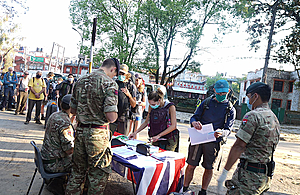British Gurkhas and UK Government rescue mission to help stranded Brits in Nepal
British Gurkhas in Nepal have helped to rescue 109 Brits stranded in remote areas across the country so they could return home on Government charter flights.

Over three weeks, the soldiers, embassy staff and locally employed drivers, travelled more than 4,000 miles through the Himalayas to 13 different districts, negotiating river crossings and landslides, to reach the tourists scattered across dozens of mountainous towns, villages and national parks.
A rescue mission to retrieve more than 100 British travellers stranded in remote parts of Nepal was carried out with military precision - when the British Gurkhas Nepal were called in.
109 British nationals, and a further 28 foreign nationals, were stuck in isolated parts of Nepal when the coronavirus crisis broke out, severely reducing transport routes in the country.
Their remote locations, and the strict lockdown measures, meant the travellers were unable to reach the three charter flights sent to repatriate British nationals back to the UK last month.
Mobilising the British Gurkhas Nepal network, based in Kathmandu, Pokhara and Dharan, and using their local knowledge, UK Embassy staff and soldiers mapped out where the stranded British travellers were, and devised a plan to reach them.
Over three weeks, the soldiers, embassy staff and locally employed drivers, travelled more than 4,000 miles through the Himalayas to 13 different districts, negotiating river crossings and landslides, to reach the tourists scattered across dozens of mountainous towns, villages and national parks.
In some instances, the soldiers and drivers were forced to set up camp for the night on the side of the road because of the long and hazardous journeys.
The British Gurkhas rescue Brits stranded in Nepal
Sergeant Prakash Gurung, of 29 Regiment, Royal Logistic Corps, rescued a British national from Manang, located in north-west Nepal, before driving the solo traveller nine-and-a-half hours back to Kathmandu to catch a UK charter flight.
Sgt Gurung, who by day is a postal operator, volunteered to complete the nine-and-half hour drive to Manang, which nearly had to be aborted part-way through due to a landslide, traversing single-track, treacherous roads to reach the stranded traveller.
Sgt Gurung, who has completed three tours of Iraq, as well as serving in Afghanistan, the Middle East, Kenya and Germany, said:
I stepped up to volunteer because I thought it was a part of my job. Helping people in dire situations gives me a sense of satisfaction. The gratitude people expressed in messages has encouraged me to do more of this sort of work.
Her Majesty’s Ambassador to Nepal, Nicola Pollitt, said:
Getting British nationals home in such an unprecedented time is a huge challenge around the world, but in a country like Nepal, with such extreme conditions, it would have been impossible to get everyone back without the close collaboration of the Embassy and British Gurkhas Nepal.
We have been able to reunite more than 700 British travellers with their families in the UK, and that would not have been possible without the tireless work of our Embassy and Gurkha team.
Lt Col Peter Wettenhall, Deputy Commander, British Gurkhas Nepal, said:
British Gurkhas Nepal has a long and proud history of operating in Nepal regardless of circumstance. It is both fitting, and in keeping with the role of the Armed Forces that when called on for assistance that we do our very best to support those in need.
We are delighted that we were able to assist the British Embassy, British Nationals and our soldiers and families in Nepal through this trying time.
As well as bringing home British travellers on the charter flights last month, around 70 soldiers and their dependants from different Regiments of the Brigade of Gurkhas and wider British Army, who were in Nepal on leave and holiday, returned to the UK to join the fight against coronavirus.
Notes to Editors:
- The soldiers involved in the rescue mission were:
- Cpl Sujan Moktan and LCpl Khopjung Gurung of the 1st Battalion the Royal Gurkha Rifles, Sir John Moore Barracks, Kent
- Cpl Bimal Rai and LCpl Narendra Rai of the 2nd Battalion the Royal Gurkha Rifles, British Forces Brunei
- Sgt Prakash Gurung of the 29 Regiment, Royal Logistic Corps, Duke of Gloucester Barracks, South Cerney, Cirencester
- Capt Khagendra Pun, Cpl Sunil Gurung, Cpl Khagendra Gurung and Cpl Amrit Gurung of 30 Signal Regiment, 250 Gurkha Signal Squadron, Gamecock Barracks, Bramcote
- SSgt Sanjay Rai, LCpl Prakash Tamang and LCpl Dinesh Ghale of the 247 Gurkha Signal Squadron, Stafford, Staffordshire
- WO2 Yogendra Limbu of 10 QOGLR, St Omer Barracks, Alison’s Road, Aldershot, Hampshire
- SSgt Sagar Limbu from the Gurkha Staff and Personal Support, HQ Brigade of Gurkhas, RMAS Sandhurst, Camberley
- WO2 Matthew Bavington of the RHQ Royal Electrical and Mechanical Engineers, Prince Phillip Barracks, MOD Lyneham, Chippenham
- The Gurkhas also assisted foreign nationals from France, Australia, Ireland, India, Spain, Canada, Germany, Italy, the US and Switzerland.
- More than 20,000 British travellers, on 83 Government charter flights, will have returned to the UK from across South Asia by 7 May.
- To find out more about The Gurkha Welfare Trust visit - https://www.gwt.org.uk/
Further information
- Follow the Foreign Office on Twitter @foreignoffice and Facebook
- Follow the Foreign Office on Instagram, YouTube and LinkedIn